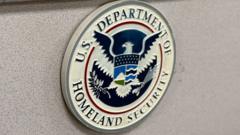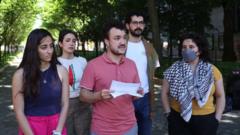The case of Kilmar Abrego Garcia, who was deported incorrectly to El Salvador, highlights significant legal and immigration issues in the US. Despite a Maryland court ordering his return, President Trump's administration contests the ruling, maintaining that they lack the authority to compel El Salvador to act. The ongoing legal battle underscores the complexities of immigration law and the rights of individuals deported under erroneous circumstances.
Legal Battle Surrounds Deportation of Immigrant Back to El Salvador

Legal Battle Surrounds Deportation of Immigrant Back to El Salvador
Kilmar Abrego Garcia’s deportation raises questions about US immigration processes and the authority of courts in such cases.
Kilmar Abrego Garcia's deportation to El Salvador has sparked a legal battle that raises serious questions about immigration law in the United States. On March 12, Garcia was taken into custody by US Immigration and Customs Enforcement (ICE) while driving home in Maryland. Despite a court ruling in his favor, he now finds himself in an infamous Salvadoran prison, initially due to what the US government labeled an "administrative error."
Garcia's case escalated quickly after his arrest. According to a federal judge, he was shipped back to El Salvador within three days, without any legal notice or hearing—a violation of proper procedures. His lawyers argue that this case could significantly undermine due process for immigrants, especially as the Trump administration takes a stringent stance on immigration.
While a Maryland district court ordered Garcia's return, Trump administration officials have countered that they cannot force the Salvadoran government to comply with such an order. US Solicitor General D John Sauer stated that neither a district court nor the United States has the authority to dictate actions to El Salvador. Yet, experts like Nicole Hallett point out that while US courts cannot command foreign governments, they can enforce obligations on US entities.
The situation is further complicated by the financial arrangement between the US and El Salvador, wherein the US paid $6 million to house deported individuals. This financial relationship might suggest that El Salvador is acting at the behest of the US, raising the stakes for Garcia’s return.
Garcia is among several nationals deported under the Trump administration, who claim they are victims of mistaken identity. His lawyers emphasize that he does not belong to any gang and is protected under a "withholding of removal" order due to fears for his safety if returned to El Salvador.
The Supreme Court is currently deliberating on the matter, having paused lower court rulings while considering the Trump administration's appeal. Chief Justice John Roberts issued an administrative stay on recent decisions, and due to this ongoing legal tussle, immigration advocacy groups are keenly observing the implications for the rights of immigrants moving forward.
The outcome of Garcia’s case could have far-reaching consequences on how deportations are handled in the US, with implications for the balance of power between judicial authority and executive action in immigration matters. If the courts favor the Trump administration's position, it could potentially reshape the immigration landscape, stripping away protections that have historically been afforded to individuals in the country.






















